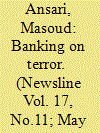| Srl | Item |
| 1 |
ID:
061661


|
|
|
| 2 |
ID:
052515


|
|
|
|
|
| Publication |
2003.
|
| Summary/Abstract |
Terrorism has global reach in its activities and in its sources of funding. There are manifold sources operating through methods that may be legal or illegal and sometimes even nefarious, and through routes that are often circuitous. Indeed, so-called charitable organizations are often used as a front to mobilize funds or serve as a conduit for the money. It is clear that if acts of terrorism are to be eliminated, the flow of money on which they ride must be stemmed at the source. This is one area in which stringent financial procedures and controls could be helpful. Equally important is the control that central banks must exercise in the financial sector, and the banking system in particular, to ensure greater accountability and better record keeping. Realistically, however, as long there is someone who operates a hawala system from a back of a store, money will keep flowing. No less important is the cooperation between countries and the enforcement of international conventions. A recent article on the transfer of money in Dubai notes that the authorities counted 429 suspicious money transfer operations between August 2001 and May 2003. Of these, only 46 cases were thoroughly investigated because there was little support from other countries involved, including Britain, Switzerland and the United States. Finally, education systems that teach jihad (holy war) as the highest calling for the individual and breeds religious intolerance must be reformed.
|
|
|
|
|
|
|
|
|
|
|
|
|
|
|
|
| 3 |
ID:
089094


|
|
|
|
|
| Summary/Abstract |
In the aftermath of the 9/11 terrorist attacks hawala, an ancient form of money transfer, has come to prominent international attention due to its ostensible role in funding global terrorism. The United States and its international allies have initiated a host of measures to try and render hawala practices more visible and hence governable. This paper details some of these measures, paying particular attention to how they connect with larger dynamics of surveillance, documentation and trust. We suggest that because officials have ignored distinctive attributes of hawala that pertain to these three dynamics, their regulatory efforts will likely have little impact on the operation of hawala. Our concluding discussion posits a number of alternative factors that might explain why officials have embraced these particular measures to try and regulate hawala.
|
|
|
|
|
|
|
|
|
|
|
|
|
|
|
|
| 4 |
ID:
022014


|
|
|
|
|
| Publication |
2002.
|
| Description |
181-198
|
|
|
|
|
|
|
|
|
|
|
|
|
|
|
|
| 5 |
ID:
089885


|
|
|
|
|
| Publication |
2009.
|
| Summary/Abstract |
In contemporary times, Hundi has collected countless labels; the international press has spurned innumerable villainous descriptions, the bulk of which have helped to perpetuate a dense fog of notoriety. The critical problem lies in definition. As there is an incomplete understanding of hundi's form and remit, there is also a rather limited understanding of why the system persists, set against the backdrop of modern banking. In many ways the problem of definition presented legal and financial authorities of the early and late twentieth century with core issues which remain unresolved and problematic for authorities in the twenty-first century. By drawing on archival and other historical material pertaining to the system's usage amongst Indian merchants, this paper attempts to tackle much of the confusion and many misconceptions surrounding hundi. The discussion explores the idea that hundi is more accurately described as an indigenous banking system endowed with a complex range of functions, but whose central purpose is trade.
|
|
|
|
|
|
|
|
|
|
|
|
|
|
|
|
| 6 |
ID:
139623


|
|
|
|
|
| Summary/Abstract |
This discussion contributes to the history of the colonial rule of law that governed market practice in India using the South Asian indigenous credit institution known as hundi. A centuries-old artery of credit for Indian merchant networks, and a living institution that has largely been driven underground by twenty-first-century laws, hundi provides a window into the dynamics of colonial law from the commercial and financial legislation of the 1880s to the final attempt to codify hundi in the 1960s and 1970s in a bid to bridge the growing disconnect between the Indian indigenous banking sector and modern banking. I chart the British colonial and post-independence history of hundi as means of understanding the wider political, legislative and economic dynamics of colonial state formation and the legacies of legislation.
|
|
|
|
|
|
|
|
|
|
|
|
|
|
|
|
| 7 |
ID:
053356


|
|
|